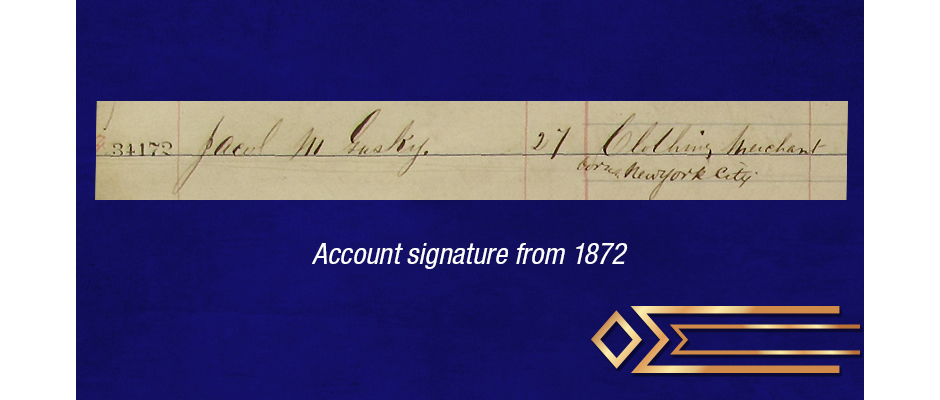Jacob M. Gusky
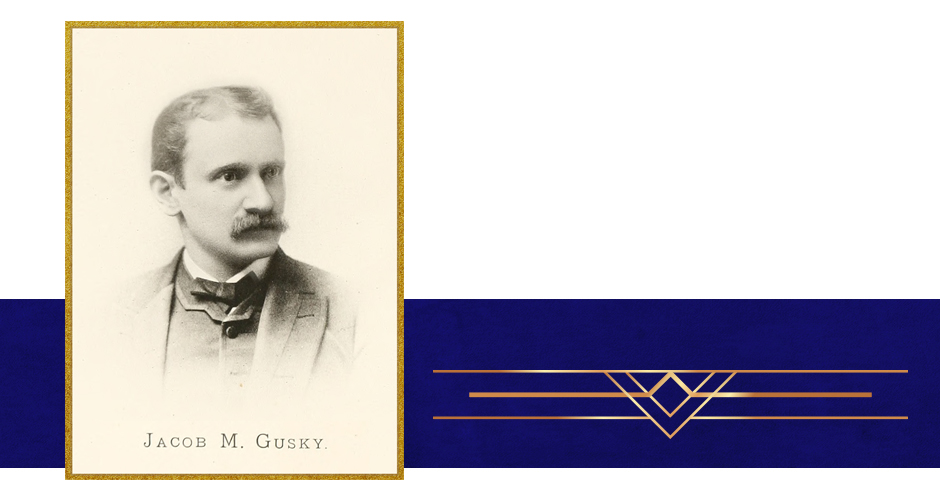
1845 – 1886
Merchant and philanthropist Jacob Mark Gusky was a successful department store owner who became one of the great benefactors of orphans around the city. His annual Christmas gift tour to Pittsburgh orphanages brought joy and wonder to countless disadvantaged children.
Gusky was born in New York City to Johanna and Marcus Gusky, a tailor. The family lived on Water Street in the bustling Seaport District of lower Manhattan. After Marcus died around 1853, Johanna remarried to Simon Cohen, a clothing cutter. Young Jacob was educated in public schools until age fifteen, after which he was apprenticed to a printer for five years.
In 1865, Jacob Gusky came to Pittsburgh at a request from one of his step-father’s acquaintances, Meyer Hanauer, a clothier who ran a small men’s wear store on Market Street. Although the store had just two employees, Gusky saw possibilities for expansion and urged his step-father to buy the business. Cohen did just that and renamed the store S. Cohen & Co. Jacob Gusky remained in Pittsburgh to manage the business.
Gusky made S. Cohen & Co. competitive by offering low-price clothing, an advantage he gained by selling goods direct from his step-father’s New York manufacturers. Pants for 98 cents. Men’s “frost-killer overcoats” for $1.10 and custom-tailored suits for as low as $12.80. As business grew, Gusky expanded the store, buying up adjoining space and ultimately remodeling the whole building. He began advertising the store as “S. Cohen & Co.’s Cheap Corner.”
In November 1871, Gusky married Esther DeWolf in New York. The couple went on to have four children, two sons and two daughters. As was often the case in that era, the operation of a department store was a family effort. Rebecca’s two brothers, Levi and William, moved to Pittsburgh to help with the running of the store. Levi eventually became head cashier and William, assistant manager. Also part of the management team in the early years of the store was Kaskel Solomon, husband of Jacob Gusky’s sister, Rebecca.
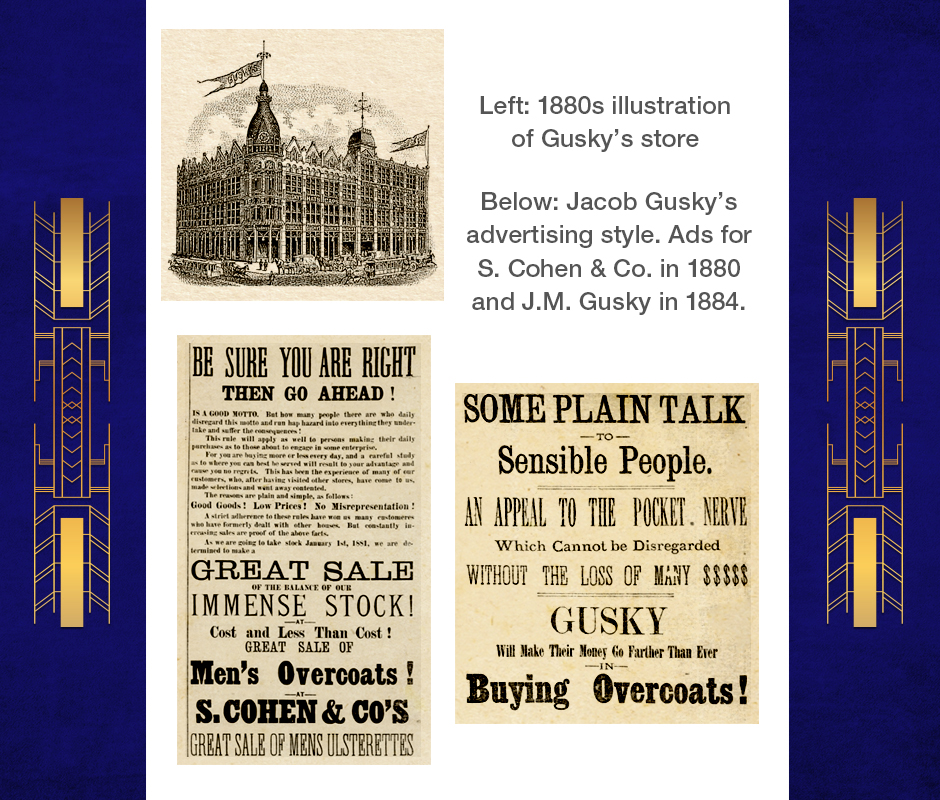
By 1880, Jacob Gusky’s advertising flair had emerged, with S. Cohen & Co. ads bearing a strong resemblance to the future ads of Gusky’s own store. Two columns wide, positioned on the edge of the page and spanning nearly the entire height of the broadsheet, the Gusky-style ad dominated with large fonts and creativity. Aphorisms or cheeky humor that appeared, at first glance, unrelated to a clothing store, were spun into descriptions of the superior shopping experience at Jacob Gusky’s establishment.
Gusky bought out his step-father’s interest in 1880 and embarked on a brief but stellar career as the owner of one of the most famous department stores in pre-1900 Pittsburgh – the firm of J.M. Gusky. Already positioned as a low-price leader, Gusky married philanthropy to commerce, demonstrating that the two interests could exist in harmony, even mutual benefit. If a man bought a suit at J.M. Gusky, he also received a complimentary child’s toy for his family or a charitable gift. Gusky made monthly donations to the Society for the Improvement of the Poor. Each Thanksgiving, he donated a turkey to every family on that institution’s rolls of the needy. Besides these official gifts, Gusky quietly performed innumerable acts of kindness, done in private, for the poor and friendless.
In 1881, Gusky embarked on what became his signature charity enterprise – a Christmas Day gift tour to orphanages and homes for the aged in Pittsburgh and Allegheny City. Gusky, who was Jewish, did this without regard to the race or creed of the recipients. All were included. The loss of his own father at a young age had obviously impressed upon him the plight of the orphaned, and he responded by channeling his prosperity into brightening Christmas for those most in need of blessings and cheer on that day.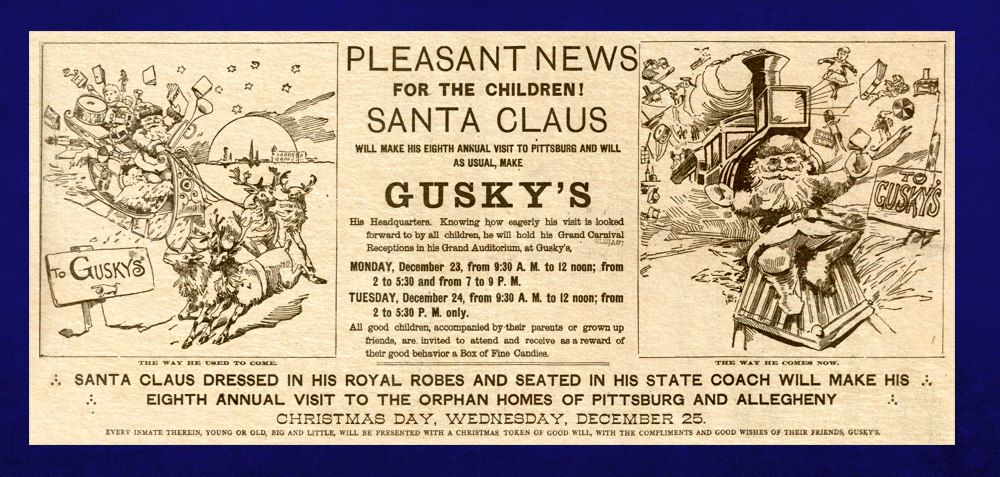
Gusky himself did not pose as Santa Claus on the gift tours. Rather, he accompanied Santa and was billed in newspaper advertisements as a dear, loyal friend of the North Pole’s most famous resident. (Unsurprisingly, Gusky heavily promoted the gift tours in the weeks leading up to Christmas.) The first gift tour, in 1881, was so enthusiastically received that it guaranteed repeat performances. Each year, the list of stops and the scale of the tour grew. The Gusky gift tour became its own kind of Christmas Day parade, with Pittsburgh residents lining the streets of the processional route and cheering as the caravan of present-laden wagons passed by. Newspapers published Gusky’s routes and schedules.
By 1885, the tour had grown so large that it required two separate caravans and two separate Santas, one procession for Allegheny City and the other for the City of Pittsburgh. Forty wagons hauled presents, Santa(s) and aides, Jacob Gusky and his family and friends, members of the press, and invited guests, who were treated with songs and short plays from the children at the orphanages. By the mid-1880s, Gusky was giving away more than 3,000 presents each Christmas.
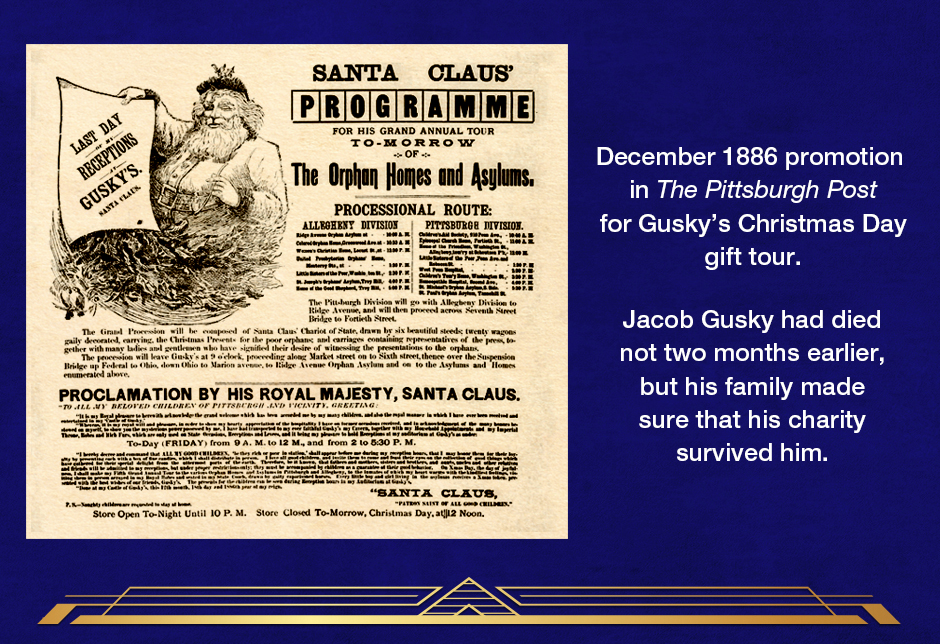
And then, in October 1886, the unthinkable happened – Jacob Gusky died at age 41. Gusky suffered from the same heart disease which would claim his son, Mark, before the age of 40, and which was likely responsible for the premature death of his own father in the early 1850s. Shock and sincere bereavement was the reaction in Pittsburgh to Gusky’s passing. His death left a genuine void for many who had personally experienced his kindness.
Gusky’s widow, Esther DeWolf Gusky, was determined that her husband’s two greatest legacies – his charity to orphans, and the remarkable store that bore his name – should continue. With the help of her brothers, Levi and William, as well as the management expertise of in-law Kaskel Solomon, Esther Gusky kept the store running. She also continued the Christmas Day gift tours to orphanages for five years after her husband’s death.
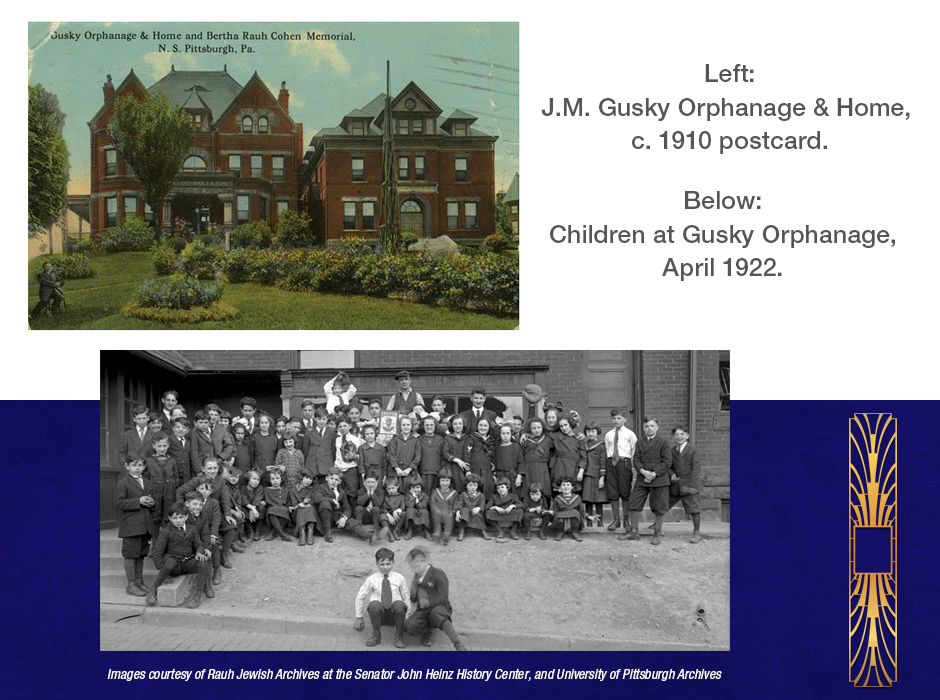
The conspicuous gap in Pittsburgh charitable institutions in the late 1800s, when orphanages were denominational homes, was that there was no asylum for Jewish orphans in the city. Orphaned Jewish children from Pittsburgh and surrounding communities were sent to Philadelphia. Given Jacob Gusky’s extraordinary compassion for orphaned children, it made sense for a Jewish institution serving that cause to be started in Pittsburgh. In June 1891, the J.M. Gusky Orphanage and Home was founded by Rebecca Gusky, in honor of the memory of Jacob Gusky. The home was at 3605 Perrysville Avenue, adjacent to Riverview Park.
Dedicating years of service to the Gusky Orphanage were many prominent Jewish citizens from the Pittsburgh community, who included Josiah and Carrie Cohen, Bertha Rauh, Lydia DeRoy, and Clara Fleishman.
The J.M. Gusky department store closed in 1904. The Gusky Orphanage continued for several more decades, until the outset of WWII. In 1950, the unoccupied building was torn down, and Greek Rite Catholic School was constructed at the same location.
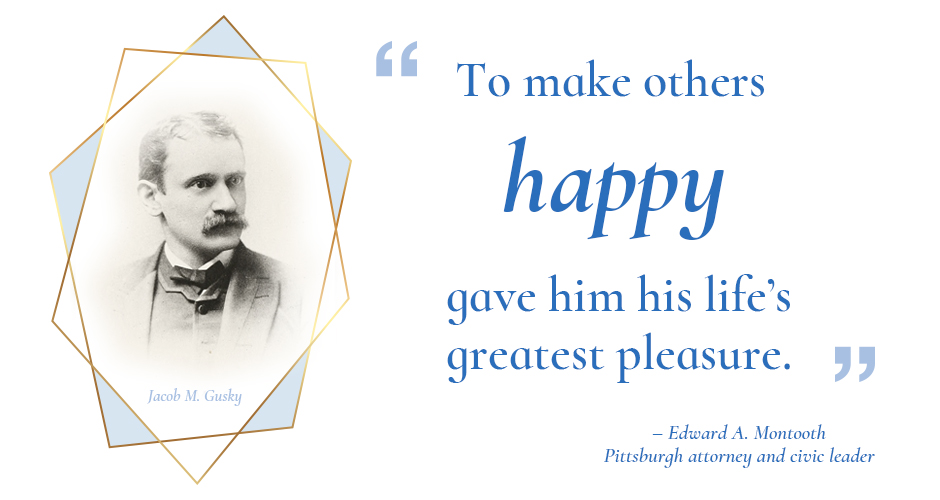
Jacob Gusky’s store was a testament to his commercial genius. Over the span of twenty-one years, he expanded the enterprise from two employees in a narrow two-story shop to a palatial four-story building with 500 employees, passenger elevators, its own power plant, and nearly 65,000 square feet of floor space.
Gusky was among the first Pittsburgh merchants to introduce receptions with a “department store Santa” to Christmas season (this was in addition to Gusky’s Christmas Day gift tours), a popular draw that was soon copied by Gusky’s cross-town rivals, the Kaufmanns.
Even greater than his business success, however, was Jacob Gusky’s impact on the community through his generosity, and the joy and hope he inspired among the destitute. His name was perpetuated through the J.M. Gusky Orphanage and Home long after the store ceased to exist. And his memory was indeed a blessing to thousands of needy children and families.
Jacob Gusky opened a savings account at Dollar Bank in January 1872.
